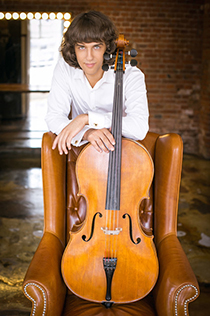 Alexander Ramm |
“Ramm plays with enormous musical authority. Unlike many young instrumentalists, he is not intimidated by the reflective or the elegiac; nor is he nervous about the length of pauses, or the creation of inter-phrase silence. He has a phenomenal technique and he demonstrated it to full effect in this captivating performance.” (Cape Times)
Alexander Ramm belongs to the new generation of cellists recognised for his appealing artistic creativity and unprecedented technical skills. Alexander started his musical education at the age of seven at the Glier music school (Kaliningrad) with Svetlana Ivanova. Her extremely serious attitude to music studies and pedagogical talent revealed the rare musical capabilities of this young cellist.
After moving to Moscow at the age of ten, he was accepted to the class of Maria Zhuravleva at the Chopin Moscow College of Music Performance. From 2007, he continued his professional education at the Moscow Conservatory in the class of the renowned musician and the People’s Artist of the USSR, Natalia Shakhovskaya, an outstanding performer and pedagogue who taught most prominent Russian cellists. Since 2012, he has become a postgraduate student at the Hanns-Eisler Hochschule fur Musik under the guidance of the famous cellist, Frans Helmerson.
From the age of nine, when he made his debut as a soloist with the Kaliningrad Chamber Orchestra, Alexander brilliantly performs with solo programmes and as a soloist with leading orchestras in Russia and worldwide.
He is prizewinner at several international competitions:
1st prize: 4th Moscow Competition for young cellists (2003)
1st prize: 1st Cambridge International Boston Competition (Massachusetts, 2005)
Grand-Prix: Moscow Festival of Romantic Music (Moscow, 2006)
4th prize: 5th UNISA International String Competition (South Africa, 2010)
1st prize: 3rd Beijing International Music Competition (Beijing 2010)
1st prize: 1st All-Russia Music Competition (Russia, 2010)
Prizewinner: Janigro Cello Competition (Croatia, 2012)
Prizewinners: Swedish Duo Competition with duo partner Anna Odintsova (2012)
3rd prize: Paulo Cello Competition (2013) – becoming the first Russian prizewinner in the history of this prestigious contest
2nd prize: XV International Tchaikovsky Competition (2015)
Alexander participated in masterclass festivals at Courchevel Academy and Holland Music Sessions, where he took lessons from the famous musicians such as F. Muller, R. Latzko, M. Kliegel and U. Wiesel. In 2011, he took part in the well-known Verbier festival, where he studied with H. Hoffmann, F. Helmerson, M. Suzuki, L. Power and F. Radosh. At the end of the festival, he was awarded the Neva Foundation top-level prize for gifted students.
Alexander cooperates with such outstanding conductors as V. Gergiev, V. Spivakov, A. Levin, K. Orbelyan, V. Polyansky, S. Kochanovsky, M. Fedotov, A. Slutsky, A. Sladkovsky.
He will be accompanied by Pieter Jacobs, a graduate of the University of Pretoria, who then furthered his studies at Yale in the United States, where he pursued his performing career with considerable success as a soloist and chamber musician in Boston, Cambridge and New Haven before returning to South Africa to perform and teach at the University of Pretoria. Pieter is regarded as one of SA’s foremost pianists and chamber musicians.
Programme:
Grieg: Cello Sonata, Op. 36 in A minor (1883)
Barber: Cello Sonata, Op. 6 in C minor (1932)
Prokofiev: Cello Sonata, Op. 119 (1949)
Piazzolla: Le Grand Tango for cello and piano
Date: 22 April 2016
Time: 19:30
Venue: Odeion
Costs: R130 (adults), R90 (pensioners), R70 (UFS staff members), R50 (students and learners), R50 (group booking of 10+). Tickets available at Computicket.
More information: Ninette Pretorius +27(0)51 401 2504.